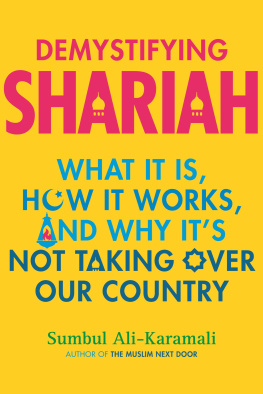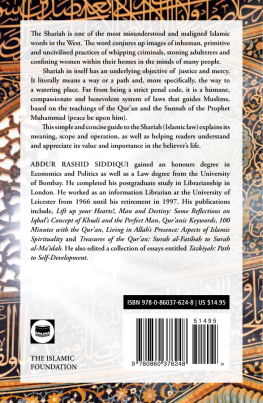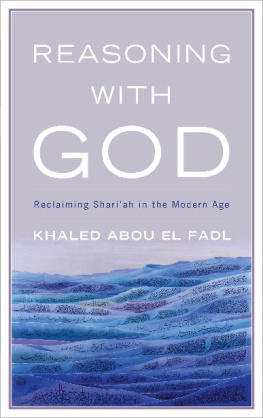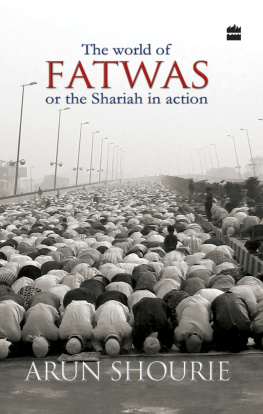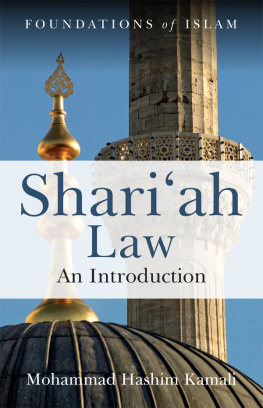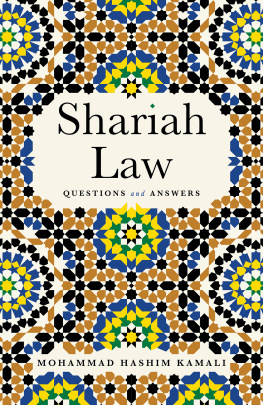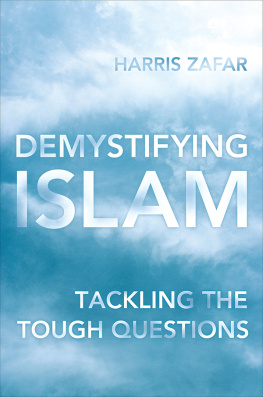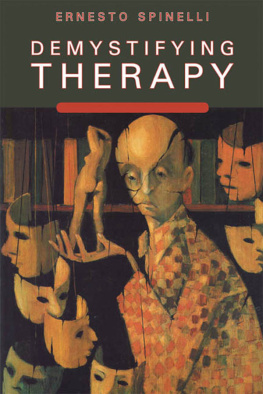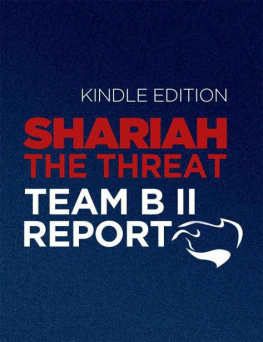Sumbul Ali-Karamali - Demystifying Shariah: What It Is, How It Works, and Why It’s Not Taking Over Our Country
Here you can read online Sumbul Ali-Karamali - Demystifying Shariah: What It Is, How It Works, and Why It’s Not Taking Over Our Country full text of the book (entire story) in english for free. Download pdf and epub, get meaning, cover and reviews about this ebook. year: 2020, publisher: Beacon Press, genre: Religion. Description of the work, (preface) as well as reviews are available. Best literature library LitArk.com created for fans of good reading and offers a wide selection of genres:
Romance novel
Science fiction
Adventure
Detective
Science
History
Home and family
Prose
Art
Politics
Computer
Non-fiction
Religion
Business
Children
Humor
Choose a favorite category and find really read worthwhile books. Enjoy immersion in the world of imagination, feel the emotions of the characters or learn something new for yourself, make an fascinating discovery.
- Book:Demystifying Shariah: What It Is, How It Works, and Why It’s Not Taking Over Our Country
- Author:
- Publisher:Beacon Press
- Genre:
- Year:2020
- Rating:3 / 5
- Favourites:Add to favourites
- Your mark:
- 60
- 1
- 2
- 3
- 4
- 5
Demystifying Shariah: What It Is, How It Works, and Why It’s Not Taking Over Our Country: summary, description and annotation
We offer to read an annotation, description, summary or preface (depends on what the author of the book "Demystifying Shariah: What It Is, How It Works, and Why It’s Not Taking Over Our Country" wrote himself). If you haven't found the necessary information about the book — write in the comments, we will try to find it.
Demystifying Shariah: What It Is, How It Works, and Why It’s Not Taking Over Our Country — read online for free the complete book (whole text) full work
Below is the text of the book, divided by pages. System saving the place of the last page read, allows you to conveniently read the book "Demystifying Shariah: What It Is, How It Works, and Why It’s Not Taking Over Our Country" online for free, without having to search again every time where you left off. Put a bookmark, and you can go to the page where you finished reading at any time.
Font size:
Interval:
Bookmark:


For my husband
U PON COMPLETING THE FIRST DRAFT OF THIS BOOK , which I had provisionally entitled Shariah in America, I realized that almost none of it had to do with shariah in America. Thats because there isnt any. Not taking over our country, anyway. I laughed, envisioning a book called Shariah in America filled with blank pages.
Islam is difficult to write about in my countrythats the United Statesbecause we are none of us here, not even Muslim Americans, completely unconditioned by the negative stereotypes so normalized in our culture, educational system, news media, and entertainment industry. Any positive discussion of Islam is dismissed as propaganda. I often ruminate on how Muslims are perceived to be aliens from Star Treks evil parallel universe, the mirror universe, where mass murder, despotism, and conquest are the normas opposed to the real (non-Muslim) universe, which we rosily view as valuing peace and cooperation. Although its not true that Muslims come from the mirror universe (in case you were wondering), so many loathsome misconceptions adhere to us that I cannot adequately explain shariah without also unwinding stereotypes, eliminating presumptions, and providing historical background for current events.
Human psychology periodically obstructs these explanations, because we all prefer comfortable information that bathes us in approbation and absolves us of transgression. I would love to believe that when my husband and I argue, it is always 100 percent his fault. No one likes acknowledging responsibility, but a discussion of Islam in the world today is not possible without explaining the colonialist role of European and American powers in Islamic history.
In defending Islam against stereotypes and countering negativity with positive examples, never do I intend to give the erroneous impression that Im declaring my religion to be better than another. Never is proselytizing my purpose. If spiritual and moral perfectionGod, if you wishresides at the top of a mountain, then I believe many paths lead there, meandering variously up the sides. As the Quran says, To me my religion, to you yours!
Of course, Im writing as a Muslim American and not, say, a Muslim Indonesian or Jordanian. As such, Im as much a cultural product of my environment as anyone. A Christian Ugandan might practice a markedly different interpretation of Christianity than a Christian American. My culture and my diverse, wonderfully multicultural, American environment, in which I am fed and clothed and housed, influences the interpretations of Islam I choose. But I am no less authentically Muslim for being American.
This book is not a compendium of all the rules of shariah on all subjects and in all countries but an introduction to the principles, goals, and general development of shariahas well as the relevance of these topics today. I include the examples of shariah in quotidian life, such as the Islamic view of same-sex relationships and what Muslims eat, to give you a sense of how Muslims engage with their religio-legal tradition; but these examples are illustrative rather than comprehensive.
Understanding Islamophobia is also crucial to any discussion of shariah, because it birthed the shariah panic. But Islamophobia is complex, and this book allows for only the merest summary. Because it affects us all, though, I urge you to read one of the excellent sources named in the suggested reading list on my website.
One of my fathers closest friends was Jewish. He read my first book on Islam, The Muslim Next Door: The Quran, the Media, and that Veil Thing, with tremendous interest, delighting particularly in the stories of my father as a new immigrant. When I despairingly felt as though I were chipping away with a teaspoon at a great granite wall of misconceptions about Islam and Muslims, he told me, When I was a kid, they said that Jews drank the blood of Christian babies. You just have to keep fighting! Keep fighting those stereotypes!
This book is a defense against the stereotypes and, I hope, a relatable discussion of shariah. The information herein isnt my personal opinion; its academically reliable, based on established scholarship and facts. And defending against stereotypes doesnt mean Im arguing that Muslims are perfectwere just not the ogres of the modern world.
Its always been easy to buy into vilification of minority groups. On the starship Enterprise, after a Starfleet admiral persecutes an innocent person solely because he is fractionally Romulan, Captain Picard converses with his chastened security officer, who has finally realized that his wholehearted embrace of the admirals tactics, shown to be bigotry and McCarthyism, was misplaced.
At least its over, says Worf, shamefaced.
She or someone like her will always be with us, responds the captain grimly, waiting for the right climate in which to flourish, spreading fear in the name of righteousness. Vigilance, Mr. Worf! That is the price we have to continually pay.
Let us be vigilant! Learning about Islam as Muslims understand itnot as the anti-Muslim propagandists deform and twist itwill deflate the sails of those spreading fear and open new avenues for intercultural and interreligious understanding. Thats what Captain Picard was fighting forthe evaluation of everyone for their integrity, not their religion or ethnicity or cultural background. Thank you for being on board.
N EARLY A DECADE AGO , attending my Stanford reunion, I stood self-consciously but optimistically in the campus bookstore beside a table piled high with copies of my book, alongside other alumni authors, when a white-haired, blue-eyed couple sporting badges labeled 50th Reunion approached me to say politely, You look like someone we could talk to. Were very much afraid that shariah law is taking over the United States.
Momentarily speechless, I struggled to address a statement that was problematic on multiple levels. Why assume that most Muslims were not people they could talk to? Was it such a surprise to see a professionally dressed Muslim woman with a nice haircut? And where did they see shariah law taking over the United States? Could they see it? Define it?
Ruthlessly suppressing these questions, I settled for assuring them that the First Amendment of the Constitution prevented any religious law from taking over our country. Not to mention, I added brightly, the Supreme Court and Congress!
I smiled engagingly. Their brows remained furrowed, their eyes troubled.
But Rush Limbaugh said it could, they said simply.
They left without buying a book.
Shariah hysteria has only worsened in the intervening years. Prior to the publication of my first book, the term shariah (or the simplified sharia) was known in some circles but absent from the American laypersons vocabulary. In the intervening ten years, though, the terms shariah andthe Western constructshariah law have acquired monstrous meanings in the West, virally infecting media and internet.
You might reasonably assume that the reason for the fear comes from groups like the Taliban and ISIS, who claim to apply shariah. Its certainly easy to point to these criminals when making the argument that shariah is fearsome. But vilification of shariah began long before the birth of these groupshundreds of years ago and even earlier, depending on how you look at itand besides, using religion to justify violence is not unique to Islam. Groups around the world commit crimes and justify them with religion; this is nothing new. The current American-European defamation of shariah is the result of another factor: a thriving, intentional disinformation campaign (discussed later in this book), which, in the last decade, has sought to spread fear of shariah as a predatory, backward, Draconian legal system that Muslims strive to impose on Muslims and hapless non-Muslims alike.
Font size:
Interval:
Bookmark:
Similar books «Demystifying Shariah: What It Is, How It Works, and Why It’s Not Taking Over Our Country»
Look at similar books to Demystifying Shariah: What It Is, How It Works, and Why It’s Not Taking Over Our Country. We have selected literature similar in name and meaning in the hope of providing readers with more options to find new, interesting, not yet read works.
Discussion, reviews of the book Demystifying Shariah: What It Is, How It Works, and Why It’s Not Taking Over Our Country and just readers' own opinions. Leave your comments, write what you think about the work, its meaning or the main characters. Specify what exactly you liked and what you didn't like, and why you think so.

